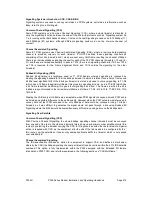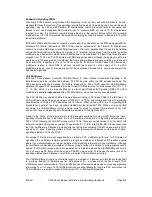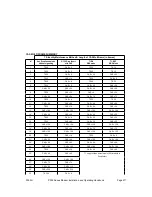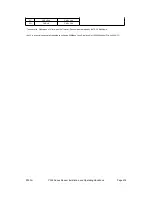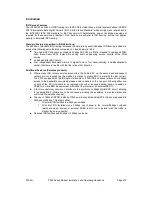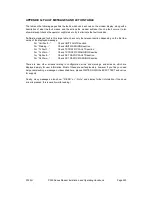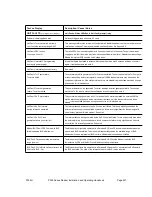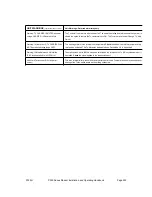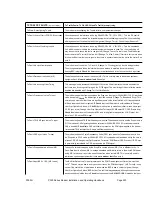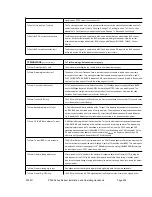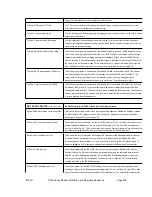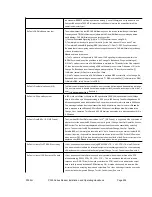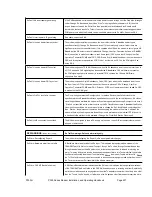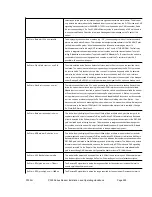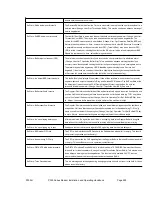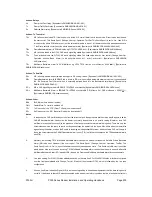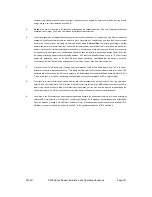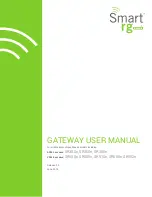
P300H
P300 Series Modem Installation and Operating Handbook
Page 229
ensure specified performance is met.
Rx Warn: Eb/No below user threshold
The Receive Eb/No (derived from the Carrier to noise ratio) is worse than the user threshold set for a
deferred alarm (Change, User-Opt, Thresholds, Eb/No). This may be used as an advance warning of
service degradation.
Rx Warn: Rx BER below user threshold
The final Bit Error Rate is worse than the user threshold set for a deferred alarm (Change, User-Opt,
Thresholds, User BER). This may be used as an advance warning of service degradation. The
source for the BER measurement is user defined (Change, User-Opt, Operation, Satellite, BER est ).
Normally this should be set to Auto , however it may be user set to other BER sources if required. It
is possible to manually set the source to the inner FEC (Turbo/Vit/Seq), even when the outer FEC
(RS) is active, thereby not including the effects of the RS error correction in the displayed user BER.
Check
this remains set to Auto unless there is good reason.
Rx Warn: Buffer slips too frequent (YES)
The minimum period between buffer slips is less than the user threshold set for a deferred alarm
(Change, User-Opt, Thresholds, Buffer Slip). This is used as an advance warning that the clock
accuracy is less than expected causing the buffer to slip more frequently in turn causing data errors.
The alarm may be muted by pressing YES.
Check
the system clocking to see if a clock has
degraded. If the clocks are correct but the buffer is slipping too frequently increasing the buffer size
will increase the period between buffer slips (but at the cost of increased delay).
Rx Warn: Ins' bearer BER>user threshold
This fault will only be displayed if the modem if fitted with an interface, which provides four ports for
separate input and output of separate Tx/Drop and Rx/Insert PCM bearers. The Bit Error Rate at the
Rx bearer input (measured on the PCM Frame Alignment Words) is worse than the user set
threshold for a deferred alarm (Change, User-Opt, Thresholds, User BER). See note 3
Rx Warn: Buffer overflow & recentre
The Doppler / Plesiochronous buffer has filled, and automatically slipped to position itself back in mid
position. Half the buffer capacity will have been discarded, but for framed data (eg T1/E1 only) frame
sync will not be lost if the user option (Change, User-Opt, Operation, Terr/Sat, Buffer MF Slip) is set
to Adjust , to ensure buffer slips are an integer multiple of the multiframe length.
Rx Warn: Buffer underflow & recentre
The Doppler / Plesiochronous buffer has emptied, and automatically slipped to position itself back in
mid position. Half the buffer capacity will have been repeated, but for framed data (eg T1/E1 only)
frame sync will not be lost if the user option (Change, User-Opt, Operation, Terr/Sat, Buffer MF Slip)
is set to Adjust , to ensure buffer slips are an integer multiple of the multiframe length.
Rx Warn: Ins' mux slipping data to sync
After a break in the Rx signal, the Insert Mux is `bit slipping` data in the Doppler Buffer to bring the
data taken out of the Buffer by the Insert Mux into step with the terrestrial (bearer) frame timing.
Rx Warn: Ins' mux slipping sig' to sync
See above text, but this time with regard to CAS signalling data not the main data path.
Rx Warn: RS Decoder FIFO slip
The FIFO, which interfaces the RS Decoder to the Deframer has slipped (full or empty). This should
never occur in operation (contact factory).
Rx Warn: Insert mux sig' FIFO slip
The FIFO, which carries the CAS signalling from the Doppler Buffer to the Insert Mux has slipped (full
or empty). This should never occur in operation (contact factory).
Rx Warn: DISTANT Eb/No below threshold
The DISTANT modems Receive Eb/No (ie this local modems TX CARRIER) is worse than the user
threshold set for a deferred alarm (Change, User-Opt, Thresholds, Distant Eb/No). This may be used
as an advance warning of service degradation. This function is only available if AUPC is active,
where the local modem continuously reads the distant modems Eb/No.
Rx Warn: Turbo Decoder status
This is a warning used in the engineeering debuging process it should not occur in the field. If it does,
please consult the factory.

